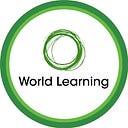The Opposite of Silence
International visitors explore the role of social media in advocating for human rights
By Alana McGinty, International Visitor Leadership Program Intern at World Learning.
“Silence never won rights. They are not handed down from above — they are forced by pressures from below.” American Civil Liberties Union founder Roger Baldwin.
Twenty International visitors to the U.S. on a Department of State International Visitor Leadership Program (IVLP) met with experts from the Robert F. Kennedy Center for Justice and Human Rights (RFK) to explore how to use social media to advocate for human rights in their respective countries. Jeffrey Smith, Africa Specialist at RFK, explained that social media has given grassroots organizations the power to influence human rights policy at the local, state, national, and international levels.
“Social media, particularly platforms like Twitter, can be useful in human rights advocacy …. [It can] help build relationships with likeminded allies, namely media professionals and journalists, who can in turn tell our stories to a much broader, and potentially, worldwide audience,” said Smith. “That is a hugely significant power to have.”
Andrew Ntewewe of Zambia, President of the Young African Leaders Initiative, said social media has been an incredibly useful tool for his organization, since they work with youth. They utilize the messaging app Whatsapp for group chats centered on relevant issues, as well as taboo subjects such as LGBTI rights. Ntewewe said participants, “can speak freely from the bottom of their mind.” The chat participants receive support, which they otherwise do not get through social media. Other IVLP participants said they have seen similar success with tools like Facebook and Twitter.
However, the use of social media is not without its challenges for many of the visitors. Dicko Buba Sulle, Founder and President of the Aku Cultural and Developmental Association in Cameroon, said limited access to electricity impedes the primary way social media is accessed — via mobile phone. In addition to simply not having access to a phone or a charger, his relatively young organization has limited capacity to manage social media as a tool for engagement, a challenge cited by other visitors as well. Dumisani Mpofu, Manager of Masakhaneni Projects Trust in Zimbabwe, said he intends to report back to colleagues and encourage them to innovate ways to use social media without diverting attention from the topics that are truly affecting the people of Zimbabwe–such as education and electricity.
Despite the challenges, visitors were incredibly excited about the opportunities to promote this medium in their home countries. Reverend Emmanuel Sebamalai from Sri Lanka, President of Mannar Citizens’ Committee, and Buba Sulle said that the meeting changed their perceptions about the utility of social media as an effective tool in the fight for human rights. Ntewewe was inspired by the ways that social media can be used to innovate and said that he hopes to use social media to target the youth vote in Zambia’s upcoming elections.
The advantages of social media were clear: from mobilizing action, to reaching remote audiences, to engaging in topics often not discussed in public. The visitors said they plan to return home and test their newfound voices through chatting, tweeting, sharing, and posting.
